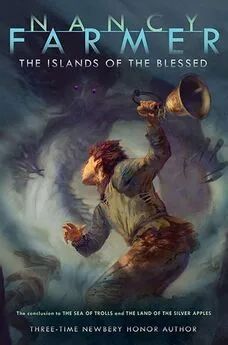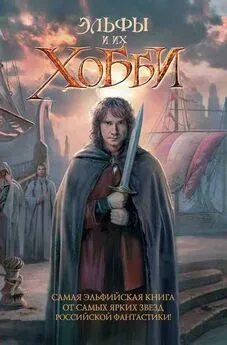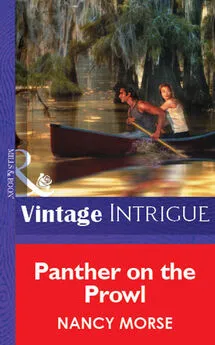Nancy - The Islands of the Blessed
- Название:The Islands of the Blessed
- Автор:
- Жанр:
- Издательство:неизвестно
- Год:неизвестен
- ISBN:нет данных
- Рейтинг:
- Избранное:Добавить в избранное
-
Отзывы:
-
Ваша оценка:
Nancy - The Islands of the Blessed краткое содержание
The crowning volume of the trilogy that began with The Sea of Trolls and continued with The Land of Silver Apples opens with a vicious tornado. (Odin on a Wild Hunt, as the young berserker Thorgil sees it.) The fields of Jack’s home village are devastated, the winter ahead looks bleak, and a monster—a draugr—has invaded the forest outside of town.
But in the hands of bestselling author Nancy Farmer, the direst of prospects becomes any reader’s reward. Soon, Jack, Thorgil, and the Bard are off on a quest to right the wrong of a death caused by Father Severus. Their destination is Notland, realm of the fin folk, though they will face plenty of challenges and enemies before get they get there. Impeccably researched and blending the lore of Christian, Pagan, and Norse traditions, this expertly woven tale is beguilingly suspenseful and, ultimately, a testament to love.
The Islands of the Blessed - читать онлайн бесплатно полную версию (весь текст целиком)
Интервал:
Закладка:
She was cloaked in a gown that shimmered with color like the inside of a shell. Hundreds of pearls were looped around her thick, scaly neck. It was such a contrast, Jack couldn’t take his eyes off her.
You’re a bold one, giving me that fish-eye look, said the sea hag.
“I—I—was admiring your dress,” he stammered.
Silver-tongued, too, the creature said approvingly. You’ll make a fine husband for one of our mermaids.
“He’s only visiting, Shair Shair,” the Bard said. “You’ll have to look elsewhere.” Shair Shair smiled in the fin folk way, as if to say, We’ll see about that. She lumbered off, for like all the sea hags, she was graceless. Jack caught a glimpse of her toes, long and scaly with claws at the tips, beneath the beautiful, shimmering robe. In spite of her unsettling appearance, Jack rather liked her, as he had liked the troll-maidens Fonn and Forath once he’d gotten used to them.
“At first everyone was standoffish and now they’re too friendly,” Thorgil complained, swiping at a merlad who was attempting to grab her hair. “Who was that monster? She had enough pearls on her to sink a ship.”
“Do not insult her,” the Bard said sharply. “She is Shair Shair, wife of the Shoney. She’s the draugr’s mother.”
“Oh, bedbugs,” said Jack, using Pega’s worst swearword. “What’s going to happen when we tell her about her daughter?”
Chapter Thirty-four
THE SHONEY’S FEAST
Nothing happened quickly in Notland, Jack discovered. The fin folk were masters of indirection. They knew that the Bard had come to see their king and did nothing to bring it about. Shair Shair had looked the visitors over and gone away. Whush invited them to follow him around. He seemed to have no particular goal in doing this.
“Can’t we just ask to see the Shoney?” Thorgil said. Both she and Jack were tired of wandering around aimlessly.
“That’s not how things get done here,” the old man said. “If we try to hurry the fin folk, they’ll simply melt away. They have a saying: ‘The longest way around is the shortest way there.’”
“It’s already long enough,” said Thorgil.
Whush, for reasons known only to himself, led them on a tour of the farms. They observed the white cattle, the barley fields, and the chicken-of-the-sea coops. They endured a long and exceedingly boring description of kelp harvesting. They were introduced to sea goats, or capricorns. These were handsome creatures with long horns and flowing hair, and Whush informed them that the hair could be used to spin cloth. Instead of hind legs, the goats had fish tails. They could both swim and leap, and were altogether charming in the way they frisked around.
But even capricorns got tedious after a while. Jack was tired and thirsty, and when they came to a dark stream, he asked whether it was all right to drink from it. Not that stream, said Whush. It comes from the queems. It wouldn’t be good for you.
“Queem?” Thorgil said. “That’s the Pictish word for ‘tunnel’.”
Yes. Tunnels of the dead.
Jack looked across the stream and realized that what he’d taken for small hills were in fact barrows. They were covered with thick grass that had turned an autumn yellow and were humped up like cats waiting to be stroked. “Tunnels going where?” he asked.
“Remember what I told you about mirrors,” the Bard said. “They are called ‘endless water’ because they are believed to be a portal to another world. The dead swim through them to a long, dark queem that leads to a bright new sea where winter never comes and the water is as clear as sky. Departed fin folk are buried with mirrors for that reason.”
I’ll bet the draugr’s barrow doesn’t contain a mirror, thought Jack. That’s why we’ve brought one. He wished they could simply drop the wretched thing off and go home, but that would have been too simple. The longest way around was the shortest way there.
Fortunately, Whush next took them to a farmhouse, where they were offered food and drink. The water was salty and the oatcakes had too much seaweed mixed into them. The farmer’s wife, a sea hag with so many barnacles that it looked like she was wearing a helmet, tried to interest Jack in one of her daughters.
Rest here. The banquet will begin late, said Whush. It was the first time anyone had suggested that they might attend the banquet. The sea hag— fin wife, Jack reminded himself—showed them into a courtyard. Kelp was heaped up for beds. It was unpleasantly clammy, but Jack was too tired to care.
It was dark when a pack of small merlads sprang upon him like so many puppies and rousted him out of bed. The dome of cloud over the courtyard flickered with lightning. A distant rumble told Jack that a thunderstorm was taking place in the outside world.
“It’s so humid,” groaned Thorgil, who had been awakened by a group of little mermaids bouncing up and down on the kelp. “I’d give anything for a swim.”
“You can swim in the air,” Jack said. He leaped upward, much to the delight of the merlads, and did a somersault.
“It isn’t the same. I feel hot and sticky.”
Jack realized that he hadn’t felt a breeze since arriving in Notland. Thick, muggy air pressed down on him, and he felt a sudden longing to be on a ship with a crisp wind at his back.
The Bard was still asleep. Jack knelt down to wake him. “What? What’s that?” said the old man, instantly coming alert.
“It’s nighttime,” Jack said. “I think we’re supposed to get ready for the banquet.”
“I don’t know how much readying we can do,” the Bard complained, rising painfully from his bed. “Drat this seaweed! It always makes my joints ache.” He walked around the courtyard to get the stiffness out. “I’d give anything to miss the banquet, but we won’t get anywhere with the Shoney if we don’t attend. He’ll insist on showing us his wealth and power. When we’re suitably awed, he’ll ask for our gifts. Then the bargaining begins.”
The fin wife showed up with two sturdy merlads bearing torches and invited them to dine before leaving. The Bard thanked her graciously. Jack wondered why they would eat before attending a feast. “She’s being polite,” explained the old man. “She knows humans don’t like ocean meat, and that’s all the Shoney’s going to serve. There are twelve huge Pictish beasts to get through, and the fin folk won’t leave until they’ve devoured every scrap. They’ll wash it down with buckets of kelp lager, a kind of beer. Stay away from the lager. You’ll be running for the bushes all day tomorrow, and there aren’t any bushes in this place.”
The fin wife had laid a table with dishes Jack recognized as Pictish beast bones, and they were each given a hardboiled seagull egg and a bowl of oyster stew. A single roast salmon graced the center of the table. The cow’s milk, served in hollowed-out whale teeth, tasted strongly of seaweed. “The flavor comes from what they eat,” pointed out Thorgil, who didn’t mind the taste at all. “During famine years the Northmen feed their cows with seaweed, and the milk is just like this.”
Afterward the entire farm family, numbering at least twenty, set out for the castle, with merlads going before and behind with torches. Everyone was excited, and Jack found it impossible to sort out the babble of voices in his head. The sky lit up with distant flashes of lightning, and dull rumbles ran around the horizon, yet the air was perfectly still. Farm smell—hay, manure, chicken-of-the-sea coops—seemed trapped next to the earth. The air seemed thicker at night.
Jack was queasy from the seaweed-flavored milk, and he glanced up at the cloud cover with longing. If only he could be out there with a wind throwing cool spray into his face!
The path took them past the black stream. Jack realized that although the water had seemed to rush past earlier, it had made no sound. Now he could see only the dark gash where it lay. Beyond, the barrows lay in a lightless land. They had melted together into one shadow.
With, of course, the queems snaking around underneath like the roots of a midnight forest.
“Will you look at that!” exclaimed Thorgil. Jack looked up to see the castle outlined in light. It seemed that the very air had come alive and twinkled with a thousand tiny sparks. They surrounded the partygoers, who were streaming in from all sides. Even the currents the fin folk made in passing glittered briefly before fading.
Presently, the glittering sparks found Jack and the others and illuminated them. He tried to see what they were, but the sparks winked out before he could focus on them, to be replaced by others. “They’re sea mites,” said the Bard. “They come out on warm, humid nights, somewhat like our fireflies. I suspect they’re attracted by the smell of kelp lager. Thousands of them manage to drown themselves in it—another reason to avoid drinking the wretched stuff.”
Once inside the walls, Whush appeared and led the Bard, Jack, and Thorgil up to a dais overlooking the courtyard. Torches blazed everywhere, making the air even warmer and more breathless. Fire pits smoked with dripping blubber. Buckets of lager were lined up against the walls, and Jack noticed that they glowed brightly with drowning sea mites. Fin men, fin wives, mermaids, and merlads descended on giant platters of roast beast, dipping down to bite off chunks and swimming away, the heavy fin wives moving more ponderously than the others.
Until then Jack had accepted the fin folk as odd almost-humans, just as he had once accepted the trolls. Now they seemed utterly alien. They resembled nothing so much as crabs tearing apart a dead seal. No emotion except ravenous hunger showed on their faces as their V-shaped mouths tore at the beast flesh. Between bites, they plunged their heads into the buckets and sucked up both lager and mites with mindless ferocity. Even the beautiful mermaids seemed devoid of intelligence.
Imagine being married to one of those, Jack thought. You’d have to live in this dank kingdom under the sea, knowing that your bride is not really human. That was why Father Severus had never considered marriage with his mermaid. For the first time Jack felt a slight sympathy for him.
“Pay attention,” murmured the Bard. Jack had been so riveted on the scene below, he hadn’t noticed what was on the dais. At first he thought he was looking at a jumble of rocks, but their brightness and color told him he was wrong.
“I’ve never seen so many jewels,” Thorgil said in an awed voice. Like all Northmen, she had a huge respect for wealth. “I don’t even know what most of them are.”
“Emeralds, rubies, sapphires, diamonds, and pearls,” said the Bard. “Amber, tourmalines, and jade. You name it, the Shoney has it. Everything’s available at the bottom of the sea. The gold and silver coins have been taken from sunken ships.”
“Do you suppose he’d miss—” began Thorgil.
“Don’t even think of it. He knows to the very last emerald the contents of his hoard.”
The shield maiden frowned. “If he pillaged it, others have the right to do the same.”
“The Shoney found it,” the old man emphasized. “All things that fall into the sea are his, including the gold dust he’s using for a floor down below.” Mermaids diving to retrieve shreds of meat caused the gold dust to spurt up and fall down just as quickly. It was very heavy.
Читать дальшеИнтервал:
Закладка:




![Джеймс Купер - Пионеры, или У истоков Саскуиханны [The Pioneers, or The sources of the Susquehannah]](/books/1066142/dzhejms-kuper-pionery-ili-u-istokov-saskuihanny-t.webp)





